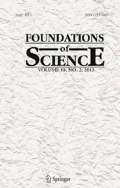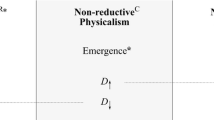Abstract
Most philosophical accounts of emergence are incompatible with reduction. Most scientists regard a system property as emergent relative to properties of its parts if it depends upon their mode of organization-a view consistent with reduction. Emergence is a failure of aggregativity, in which ``the whole is nothing more than the sum of its parts''. Aggregativity requires four conditions, giving powerful tools for analyzing modes of organization. Differently met for different decompositions of the system, and in different degrees, the structural conditions can provide evaluation criteria for choosing decompositions, ``natural kinds'', and detecting functional localization fallacies, approximations, and various biases of vulgar reductionisms. This analysis of emergence and use of these conditions as heuristics is consistent with a broader reductionistic methodology.
Similar content being viewed by others
REFERENCES
Abbott, A.: 2001, Chaos of disciplines. Chicago: University of Chicago Press, ch. 6. This analysis will appear as ch. 8 of his forthcoming book, Chaos among the Disciplines.
Allen, G.: 1979, Thomas Hunt Morgan: The Man and His Science. Princeton: Princeton University press.
Bechtel, W. and R.C. Richardson: 1992, Discovering Complexity: Decomposition and Localization as Scientific Research Strategies. Princeton: Princeton University Press.
Callebaut, W.: 1993, Taking the Naturalistic Turn, or How Real Philosophy of Science is Done. Chicago: The University of Chicago Press.
Cartwright, N.: 1983, How the Laws of Physics Lie. London: Cambridge U. P.
Darden, L.: 1992, Theory Change in Science: Strategies from Mendelian Genetics. New York: Oxford U. P.
Dennett, D.: 1995, Darwin's Dangerous Idea. New York: Simon and Schuster.
Downes, S. M.: 1992, The Importance of Models in Theorizing: A Deflationary Semantic View. In D. Hull, M. Forbes and K. Okruhlik (eds.), PSA-1992. East Lansing: The Philosophy of Science Association, 1: 142–153.
Glennan, S. S.: 1992, Mechanisms, Models, and Causation, Ph. D. dissertation, Department of Philosophy, The University of Chicago.
Griesemer, J. and W. Wimsatt: 1989, Picturing Weismannism – Case Study of Conceptual Evolution. In M. Ruse (ed.), What Philosophy of Biology is Not, (Festschrift for David Hull) Dordrecht: Martinus-Nijhoff, 75–137.
Kauffman, S.: 1971, Articulation of Parts Explanations in Biology and the Rational Search for Them. In R. Buck and R.S. Cohen (eds.), PSA-1970. Dordrecht: Reidel, 257–272.
Kauffman, S.: 1993, The Origins of Order: Self-organization and Selection in Evolution. London: Oxford U. P.
Levins, R.: 1966, The Strategy of Model Building in Population Biology, American Scientist: 421–431.
Levins, R.: 1968, Evolution in Changing Environments, Princeton: Princeton University Press.
Levins, R.: 1973, Complexity. In C.H. Waddington (ed.), Towards a Theoretical Biology, v. 3. Edinburgh: University of Edinburgh Press
Levins, R. and R.C. Lewontin: 1985, The Dialectical Biologist, Cambridge: Harvard University Press.
Lewontin, R.C.: 1978, Adaptation, Scientific American, September.
Mainschein, J.: 1991, Transforming Traditions in American Biology, 1880–1915. Baltimore: Johns Hopkins University press.
Martinez, S.: 1992, Robustness and Objectivity, draft ms. in English, 1992 (Spanish version published in Dianoia, (Annual of Instituto de Investigaciones Filosoficas, Universidad Nacional Autonoma de Mexico)), 1992.
McClamrock, R.: 1991, Marr's Three Levels: A Re-Evaluation, Minds and Machines1: 185–196.
Moss, L.: 1992, A Kernel of Truth? On the Reality of the Genetic Program. In D. Hull, M. Forbes and K. Okruhlik (eds.), PSA-1992, volume 1. East Lansing: The Philosophy of Sciences Association, 335–348.
Nagel, E.: 1961, The Structure of Science, New York: Harcourt Brace & World.
Ramsey, J.L.: 1990, Meta-Stable States: The Justification of Approximative Procedures in Chemical Kinetics, 1923–1947. Ph.D., Committee on Conceptual Foundations of Science, University of Chicago.
Rosenberg, A.: 1978, The Supervenience of Biological Concepts, Philosophy of Science45: 368–386.
Sarkar, S.: 1992, Models of Reduction and Categories of Reductionism, Synthese91: 167–194.
Schank, J.C. and W.C. Wimsatt: 1993, ModelBuilding 2.0, Simulation software to run on the Macintosh family for teaching model building and its critical analysis. Part of the BioQUEST library of Strategic Simulations. New York: Academic Press.
Simon, H.A.: 1962, The Architecture of Complexity, reprinted in his The Sciences of the Artificial. MIT Press, 1981. 3rd. ed., 1996.
Wade, M.J.: 1996, Adaptation in Subdivided Populations:Kin Selection and Interdemic Selection. In M. Rose and G. Lauder (eds.), Adaptation. New York: Academic Press, 381–405.
Waters, K.: 1990, Why the Anti-reductionist Consensus Won't Survive the Case of Classical Mendelian Genetics. In A. Fine, M. Forbes and L. Wessels (eds.), PSA-1990. East Lansing: The Philosophy of Science Association, 1: 125–139.
Wimsatt, W.C.: 1971, Some Problems with the Concept of ‘Feedback’. In R.C. Buck and R.S. Cohen (eds.), PSA-1970 (Boston Studies in the Philosophy of Science, vol.8), Dordrecht: Reidel, 241–256.
Wimsatt, W.C.: 1974, Complexity and Organization. In R. Buck and R.S. Cohen (eds.), PSA-1972, Boston Studies in Phil. Sci.20: 67–86.
Wimsatt, W.C.: 1976a, Reductionism, Levels of Organization and theMind-Body Problem. In G.G. Globus, G. Maxwell and I. Savodnik (eds.), Consciousness and the Brain. New York: Plenum, 199–267.
Wimsatt, W.C.: 1976b, Reductive Explanation – A Functional Account. In A.C. Michalos, C.A. Hooker, G. Pearce and R.S. Cohen (eds.), PSA-1974 (Boston Studies in the Philosophy of Science, volume 30)Dordrecht: Reidel, 671–710.
Wimsatt, W.C.: 1979, Reduction and Reductionism. In P.D. Asquith and H. Kyberg (eds.), Current Research in Philosophy of Science. East Lansing, Michigan: The Philosophy of Science Association, 352–377.
Wimsatt, W.C.: 1980b, Reductionistic Research Strategies and their Biases in the Units of Selection Controversy. In T. Nickles (ed.), Scientific Discovery-vol.II: Case Studies. Dordrecht: Reidel. 213–259.
Wimsatt, W.C.: 1981a, Robustness, Reliability and Overdetermination. In R. Brewer and B. Collins (eds.), Scientific Inquiry and the Social Sciences. San Francisco, Jossey-Bass. (festschrift for Donald Campbell)
Wimsatt, W.C.: 1985, Heuristics and the Study of Human Behavior. In D.W. Fiske and R. Shweder (eds.), Metatheory in Social Science: Pluralisms and Subjectivities. Chicago: University of Chicago Press, 293-314.
Wimsatt, W.C.: 1986, Forms of Aggregativity. In A. Donagan, N. Perovich and M. Wedin (eds.), Human Nature and Natural Knowledge, (Festschrift for Marjorie Grene), Dordrecht: Reidel, 259–293.
Wimsatt, W.C.: 1987, False Models as means to Truer Theories. In M. Nitecki and A. Hoffman (eds.), Neutral Models in Biology. London: Oxford University Press, 23–55.
Wimsatt, W.C.: 1992, Golden Generalities and Co-opted Anomalies: Haldane vs. Muller and the DrosophilaGroup on the Theory and Practice of Linkage mapping. In S. Sarkar (ed.), The Foundars of Evolutionary Genetics. Martinus-Nijhoff, Dordrecht, 107–166.
Wimsatt, W.C. and J.C. Schank: 1993, Modelling – A Primer, 230 page lab manual/textbook accompanying BioQUEST software (Schank and Wimsatt, 1993) to teach model building and its critical analysis using as examples single species growth equations (logistic and minimum-density limited logistic) and a model of blending inheritance, showing that we can use false models to build better ones. New York: Academic Press.
Wimsatt, W.C.: 1994, The Ontology of Complex Systems: Levels, Perspectives, and Causal Thickets. In M. Matthen and R. Ware (eds.), Biology and Society: Reflections on Methodology, Canadian Journal of Philosophy20: 207–274.
Wimsatt, W.C.: 1997, Functional Organization, Functional Analogy, and Functional Inference, Evolution and Cognition3(2): 102–133.
Wimsatt, W.C.: 2002, Re-Engineering Philosophy for Limited Beings: Piecewise Approximations to Reality. Cambridege: Harvard U. P.
Author information
Authors and Affiliations
Rights and permissions
About this article
Cite this article
Wimsatt, W.C. Emergence as Non-Aggregativity and the Biases of Reductionisms. Foundations of Science 5, 269–297 (2000). https://doi.org/10.1023/A:1011342202830
Issue Date:
DOI: https://doi.org/10.1023/A:1011342202830




